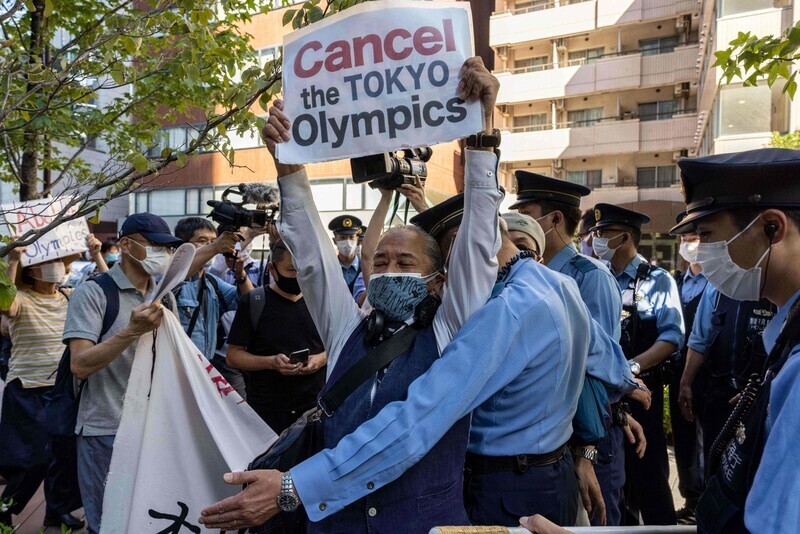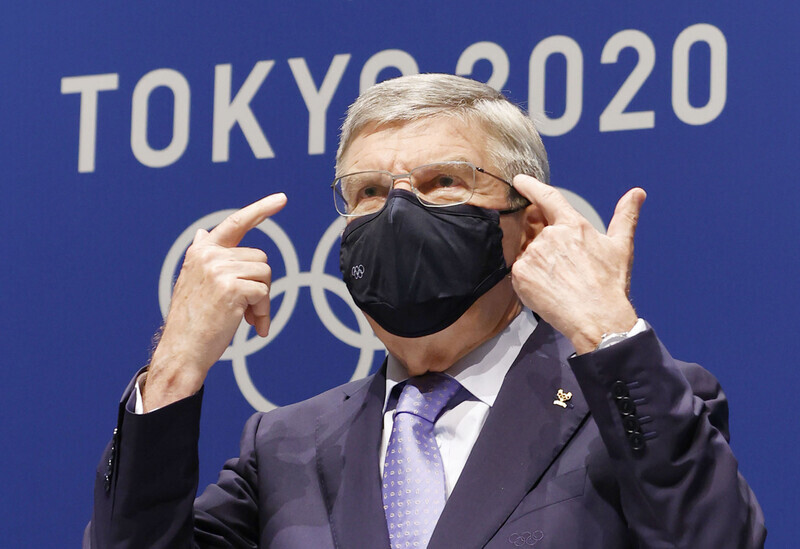hankyoreh
Links to other country sites 다른 나라 사이트 링크
With 4 days to go until Tokyo 2020, Japanese public remains opposed to holding Olympics

“Dokidoki” is a Japanese sound symbolism expression that indicates a pounding heart. The Korean equivalent “dugeundugeun” is typically used to refer to excitement, but in Japanese it is also used to express anxiety and fear.
These kinds of heart-pounding worries can be found all around Tokyo today.
“They’re lying. They’re exploiting the public’s feelings. That money should have been used for people who suffered from the disaster.”
This was the forceful response from 27-year-old Yuri Takase when she was asked what she thought about former Prime Minister Shinzo Abe and the Japanese administration referring to the Summer Olympics in Tokyo as the “comeback Olympics.”
A 24-year-old elementary school teacher who lives in Tokyo said, “For it to be a ‘comeback Olympics,’ they’d have to take care of the problems first before holding them. It’s a mystery to me why they’re going ahead with the Olympics when we have so many immediate problems to address.”
Most of the Japanese people interviewed by the Hankyoreh shared the same negative attitude toward the Olympics.
The biggest concern of all is the spread of COVID-19.
On June 19, the Mainichi Shimbun newspaper and the Social Survey Research Center conducted a survey of Japanese voters. The results showed 64 percent of respondents saying they did not believe it was possible to hold the Tokyo Olympics in a “safe and secure” way.
For four straight days since Wednesday, Japan’s new confirmed COVID-19 cases have exceeded 3,000 daily.
After arriving in Tokyo on July 8, International Olympic Committee (IOC) President Thomas Bach said the Tokyo Olympics were the “best ever prepared.” But despite his confident pronouncement, fears have been mounting after the first confirmed COVID-19 cases in the Olympic Village on Friday.

Compounding the anxiety were revelations that one of the members of the Ugandan squad — which had two of its members test positive — was unaccounted for in Osaka. It was a situation that could be seen as indicating a breach in the disease control bubble.
To date, a total of 45 people connected with the Tokyo Olympics have tested positive for the virus.
In terms of average confirmed cases per million people, Japan’s COVID-19 situation is relatively favorable, with a rate of around 6,600 compared with the global average of about 24,000. Some 140 countries around the world are doing worse than Japan on that count.
But with the transmission of the virus showing no signs of slowing, many in Japan are questioning whether the country needs to run the risk of gathering people from around the world and holding a competition under the circumstances.
In an apparent gesture to these concerns, Bach sounded a more muted note in a visit Saturday to the Main Press Centre in Tokyo’s Koto Ward.
“I humbly ask the people of Tokyo to welcome these athletes warmly, to cheer them even if only remotely,” he said.
But the frustration across the Japanese islands has continued unabated. Meanwhile, the approval rating for Prime Minister Yoshihide Suga’s Cabinet has hit record lows for consecutive days.
In response to a comment of the lack of an “Olympic atmosphere” in Tokyo, a 21-year-old university student said, “Things look quiet on the outside, but underneath, people are seething.”
Bach’s emphasis on the athletes has also left the Japanese public feeling raw.
Seiko Kitatani, a 21-year-old university student majoring in informatics, said, “I know the Olympic Committee and government are doing their best for the athletes, but we [the Japanese public] are also struggling a lot living from day to day.”
“I wish they wouldn’t use the athletes to justify them holding an event for the sake of their own interests,” she said.
People also voiced complaints about the administration emphasizing the national economy.
A 57-year-old employee at a business hotel in the Olympic football venue of Saitama Prefecture near Tokyo, said, “I don’t mind if our guest numbers don’t rise. I just don’t want the Olympics to go on.”
“Most Japanese people see an end to COVID-19 as being the top priority. Not only are infections rising in Japan, but there’s also the risk of people from other countries getting infected during their journey,” she added.
The Japanese public is now raising basic questions about the Olympics.
“When I see news about the Olympics these days, I find myself asking who this event is supposed to be for,” said a 42-year-old.
“I’m fortunate not to have lost my job, but there are people around me who have lost their jobs, and there are others who go from day to day worrying about whether they’ll go out of business,” she said.
“Who is this ‘comeback’ for? Who do these interests serve?”
By Lee Jun-hee, staff reporter
Please direct comments or questions to [english@hani.co.kr]

Editorial・opinion
![[Column] When ‘fairness’ means hate and violence [Column] When ‘fairness’ means hate and violence](https://flexible.img.hani.co.kr/flexible/normal/500/300/imgdb/original/2024/0516/7417158465908824.jpg) [Column] When ‘fairness’ means hate and violence
[Column] When ‘fairness’ means hate and violence![[Editorial] Yoon must stop abusing authority to shield himself from investigation [Editorial] Yoon must stop abusing authority to shield himself from investigation](https://flexible.img.hani.co.kr/flexible/normal/500/300/imgdb/original/2024/0516/4417158464854198.jpg) [Editorial] Yoon must stop abusing authority to shield himself from investigation
[Editorial] Yoon must stop abusing authority to shield himself from investigation- [Column] US troop withdrawal from Korea could be the Acheson Line all over
- [Column] How to win back readers who’ve turned to YouTube for news
- [Column] Welcome to the president’s pity party
- [Editorial] Korea must respond firmly to Japan’s attempt to usurp Line
- [Editorial] Transfers of prosecutors investigating Korea’s first lady send chilling message
- [Column] Will Seoul’s ties with Moscow really recover on their own?
- [Column] Samsung’s ‘lost decade’ and Lee Jae-yong’s mismatched chopsticks
- [Correspondent’s column] The real reason the US is worried about Chinese ‘overcapacity’
Most viewed articles
- 1China calls US tariffs ‘madness,’ warns of full-on trade conflict
- 2[Column] When ‘fairness’ means hate and violence
- 3[Column] US troop withdrawal from Korea could be the Acheson Line all over
- 4Could Korea’s Naver lose control of Line to Japan?
- 5[Editorial] Yoon must stop abusing authority to shield himself from investigation
- 6Naver’s union calls for action from government over possible Japanese buyout of Line
- 7[Column] Welcome to the president’s pity party
- 8[Column] How to win back readers who’ve turned to YouTube for news
- 9DongA Ilbo and the government are told to apologize for past civil rights violations
- 10S. Korea’s spy agency ramping up national security investigations to keep itself relevant, critics s